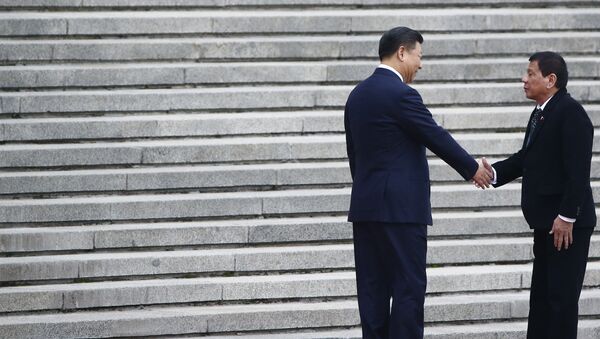Chinese President Xi Jinping has called on the Philippines to take a “bigger step” toward the joint development of offshore oil and gas resources, saying greater cooperation in this area would be possible if the two countries were to “put aside” their territorial dispute in the South China Sea, Xinhua has reported.
Speaking to Duterte on Thursday, Xi said increased cooperation would “not only benefit the two countries and their peoples, but will also add positive energy to regional peace and stability.”
According to Xi, the Chinese and Philippines’ economies could also take advantage of one another’s economic initiatives, including China’s Belt & Road Initiative and the Philippines’ ‘Build, Build, Build’ programme to develop new infrastructure, industrial, telecommunications and energy projects.
In a press conference on Friday, Duterte spokesman Salvador Panelo confirmed that the two leaders had brought up the South China Sea dispute, including the 2016 ruling by the Permanent Court of Arbitration in The Hague, which concluded that there was no legal basis for China’s historical claims over wide swathes of the body of water.
The dispute includes conflicting claims over Reed Bank, an 8,850 square km area of the South China Sea northeast of the Spratly Islands west of the Philippines where much of the region’s known oil and gas reserves are based, and where Chinese and Philippines vessels have clashed repeatedly over fishing rights.
Duterte raised the ruling “unequivocally, assertively but friendly” with Xi Panelo said, according to Reuters, with the Chinese leader reportedly responding that Beijing does not recognise The Hague’s recommendations. Nevertheless, the two sides recognised “the importance of self-restraint and respect for freedom of navigation in –and overflight above – the South China Sea,” he said.
“As long as the two sides handle the South China Sea issue properly, the atmosphere of bilateral ties will be sound, the foundation of the relationship will be stable, and regional peace and stability will have an important guarantee,” Xi said in his meeting with Duterte, adding that the issue should be dealt with without “external interference.”
Duterte has been criticised at home, including by his own vice president, for “selling out” to China amid the warming of relations under his tenure as president. Last month, Philippines Defence Secretary Delfin Lorenzana accused China of “bullying” smaller claimant states such as the Philippines in the South China Sea. Duterte has rejected such criticism, saying any conflict in the South China Sea could spark a major war with China in which the Philippines’ military would be “decimated.”
Along with China and the Philippines, Brunei, Malaysia, Vietnam and Taiwan also lay claim to part of the South China Sea. China controls the vast majority of the sea area, and has established military outposts and air bases in the region by building artificial islands. Over $5 trillion in maritime cargo, including much of China’s Middle Eastern oil supplies, pass through the South China Sea each year. The area is also extremely rich in fishing stocks and untapped energy resources.





